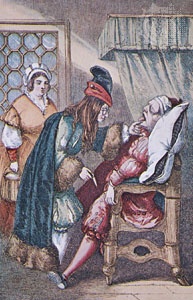Eulenspiegel, Till
German literature
Low German Dylulenspegel
 German peasant trickster whose merry pranks were the source of numerous folk and literary tales.
German peasant trickster whose merry pranks were the source of numerous folk and literary tales.The historical Till Eulenspiegel is said to have been born at Kneitlingen, Brunswick, and to have died in 1350 at Mölln, Schleswig-Holstein, where his gravestone has been known since the 16th century. Anecdotes associated with his name were printed about 1500 in one or more Low German language versions. The earliest extant text is Ein kurtzweilig Lesen von Dyl Vlenspiegel (Antwerp, 1515; “An Amusing Book About Till Eulenspiegel”); the sole surviving copy is in the British Library, London. The jests and practical jokes, which generally depend on a pun, are broadly farcical, often brutal, sometimes obscene; but they have a serious theme. In the figure of Eulenspiegel, the individual gets back at society; the stupid yet cunning peasant demonstrates his superiority to the narrow, dishonest, condescending townsman, as well as to the clergy and nobility.
The Low German text, or parts of it, was translated into Dutch and English (c. 1520), French (1532), and Latin (1558). A later English version, Here beginneth a merye Jest of a man that was called Howleglas, appeared c. 1560. Eulenspiegel has been the subject of musical and literary works, notably Charles de Coster's The Glorious Adventures of Tyl Eulenspiegl (in French; 1867), Richard Strauss's symphonic poem Till Eulenspiegels lustige Streiche (1894–95; Till Eulenspiegel's Merry Pranks), and Gerhart Hauptmann's epic poem Till Eulenspiegel (1928).
- Eugène Seers
- Eugène Sue
- Eugène Ysaÿe
- Eugénie
- Eugénio de Andrade
- Eugénio de Castro
- Eugénio Tavares
- Euhemerus
- eukaryote
- eulachon
- Eulalius
- Eulenburg, Botho, Graf zu
- Eulenburg, Philipp, Fürst zu
- Eulenkrüg
- Eulenspiegel, Till
- Euler characteristic
- Euler-Chelpin, Hans von
- Euler, Leonhard
- Euler, Ulf von
- Eumenes
- Eumenes I
- Eumenes II
- Eumenius
- eumolpique
- Eumolpus